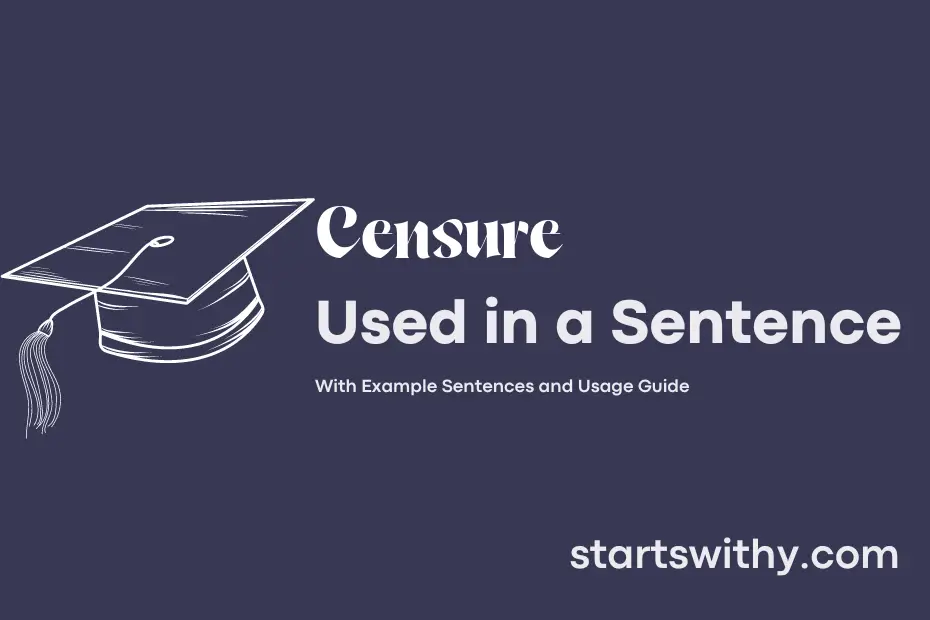Have you ever wondered what it means when someone is subject to censure? Censure refers to the formal expression of disapproval or severe criticism towards someone or their actions. It is a powerful tool often used in professional settings or politics to hold individuals accountable for their behavior or decisions.
When censure is imposed, it serves as a public rebuke and can have significant consequences for the individual being censured. This action highlights that the person’s actions are not condoned or accepted by the group or organization, sending a strong message that accountability is being upheld.
7 Examples Of Censure Used In a Sentence For Kids
- Do not censure your friends for making mistakes.
- We should not censure others for being different.
- It is not nice to censure someone’s artwork.
- Remember to speak kindly and not censure others.
- Let’s work together and not censure each other.
- It’s important to encourage others instead of censuring them.
- We should always try to understand before we censure someone.
14 Sentences with Censure Examples
- Censure from professors can be a wake-up call to improve our academic performance.
- It is important for college students to understand the consequences of censure for plagiarism.
- Censure of irresponsible behavior at college events helps maintain a respectful campus environment.
- Students should be aware of the university’s policies to avoid facing censure.
- The student council meeting ended with a censure of the treasurer for mishandling funds.
- Peer censure can sometimes be more effective than punishment from authority figures.
- Writing a formal apology can help mitigate the impact of censure from the college administration.
- It is crucial for student leaders to address issues promptly to prevent censure from the student body.
- Student unions play a significant role in bringing attention to issues that require censure.
- Expressing dissenting opinions in a respectful manner can lead to constructive dialogue rather than censure.
- The college’s zero-tolerance policy on harassment ensures quick censure of perpetrators.
- The disciplinary committee met to discuss possible censure for students involved in a recent altercation.
- Lack of clarity in the college’s dress code can lead to censure from faculty members.
- Attend workshops on academic integrity to prevent censure for unethical practices.
How To Use Censure in Sentences?
Censure is a verb that means to formally criticize or express disapproval of someone or something.
Here’s how you can use censure in a sentence:
-
When you want to express disapproval of someone’s actions: “The teacher decided to censure the student for cheating on the exam.”
-
When you want to criticize a decision or policy: “The board of directors voted to censure the CEO for his handling of the company’s finances.”
-
When you want to officially reprimand someone for their behavior: “The government issued a statement to censure the officials involved in the corruption scandal.”
-
When you want to show disapproval or criticism in a formal way: “The committee decided to censure the member who violated the code of conduct.”
Remember, censure is a strong word, so it is typically used in more formal or official contexts. It is important to consider the impact of using censure in a sentence and use it appropriately.
Conclusion
In conclusion, censure refers to the formal disapproval or criticism of someone’s actions. It is often used in parliamentary settings to mark condemnation of unacceptable behavior, such as ethical misconduct or incompetence. Through censuring individuals, organizations, or governments, society aims to hold them accountable for their actions and discourage similar misconduct in the future. By issuing censures, authorities ensure a level of transparency and integrity in public institutions, safeguarding the trust and respect of the public.
Censures serve as a means of upholding standards and ethics in various spheres of society. They play a critical role in promoting accountability and maintaining the credibility of individuals in positions of power. By publicly expressing disapproval through censure, individuals or organizations are reminded of their obligations and responsibilities, ultimately working towards maintaining the integrity and ethical standards of communities and institutions.



